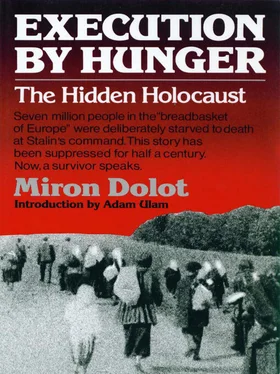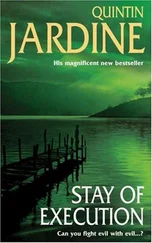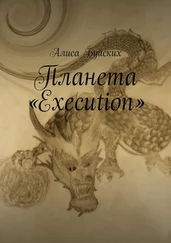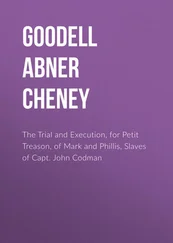Then the farmers would give their accounts. The challenger was left alone, but the one challenged had to either accept or refuse the challenge to the “socialist competition.” If not, why? If yes, why was he still not on the list of the loyal Soviet citizens, i.e., the members of the collective farm? This was a painful moment for the honest villager for he could not afford the luxury of flatly refusing and telling all the officials to go to hell, which, no doubt, he gladly would have done. On the other hand, he could not find any acceptable excuse. All the villagers could do was to mumble: “I’m not ready yet.” Of course, such a statement would trigger new threats and admonishments.
With the reports on the competition over, the meeting proceeded with the next point on the agenda: personal reporting. Every member of our Hundred had to appear before the assembly and answer the questions of why he had not yet joined the collective farm, and when he intended to do so.
These meetings usually lasted all night, and on Sundays, all day. Hungry and terrorized, the villagers quietly listened and obligingly answered the multitude of questions, but stubbornly stood their ground. Nothing could move them. At least that is what they thought.
But the Communist officials were not ready to give up their ground either. They were waging a war, and they knew that where one tactic did not work, another might. And this was precisely what happened.
At the end of February and the beginning of March 1930, the officials appraised the situation, regrouped their forces, devised new tactics for the offensive, and then delivered a smashing blow.
One Sunday, we learned that, except for Khizhniak, Khomenko, and Comrade Judas, all the Hundred’s functionaries, including those of the Tens, Fives, and all the other subunits throughout the village had been reassigned. Some of those whose subunits were not among the first in meeting the collectivization quotas, were assigned to the neighboring villages. At about the same time, some functionaries from neighboring villages and towns arrived in our village. In strange surroundings, these farmer functionaries became more aggressive.
About this time, the village Party strategists introduced a new tactic that we called “dog eat dog.” Those farmers who were previously considered kurkuls and those who had been persecuted in one way or another and were still living in the village were reinstated in the good graces of the Communist officials and engaged in active work for the Party and the government. These tactics worked even better than the officials had expected. The farmers were told that they deserved to be shot, but they were being given a chance to prove themselves worthy of living. What they had to do was to help the Party and the Government to collectivize the farmers. Of course, if they proved themselves worthy, they would be accepted into the collective farm also. And so these so-called kurkuls became staunch activists, for the desire to prove themselves “worthy” drove them to become merciless executors of Party policy.
Moreover, since they were farmers, they knew the psychology of their fellow villagers, and therefore were the most capable in devising new ways and means of forcing their fellows to comply with Communist policies and demands.
IDO NOT remember very much about my father, for I was only three when he died in 1919. But I clearly remember his funeral. A Red Guard stood at his deathbed. He wore a red cap, and in his hands he held a huge rifle with a bayonet fixed to its muzzle. He stood motionless and silent, like a granite statue gazing ahead into empty space. Later I was told that only when someone moved closer to the deathbed, or showed an intention of uncovering the dead body would he move, raising his rifle and uttering strange words. My brother thought that he and all the other strangers in uniform did not speak our language.
There were many people out of doors that day, people I had never seen before. I remember that they wore red caps, were dressed in uniforms, and had come on horseback.
My father’s body was laid under the icons on a bench which stood in the east corner of the living room. I remember that we, his children—my six-year-old brother, my baby brother, and myself—were brought trembling to the bedside to bid our farewells. Although I could not see my father because he was in a sealed coffin, I was told to say good-bye and kiss him anyway. Someone lifted me, and I remember pressing my lips on the spot where father’s head was supposed to be. I also remember that my mother and all the other people—relatives and neighbors—lamented and sobbed. But I did not cry. Those strangers with the red caps, guns, uniforms, and horses held my interest more than my deceased father.
As time went by, and I grew older, this scene often flashed through my mind, arousing my curiosity. I wanted to know what had actually happened on that day, and yet mother always managed to avoid my questions. She told me that he died; but she never said how he died.
It was not until one evening, when we returned from one of the village meetings at which the kurkuls had been denounced as the “enemies of the people,” that my mother decided to tell us the truth.
My father’s farm was hardly big enough to support his growing family and to satisfy the state’s demand for ever-increasing taxes. He had only about fifteen acres of arable land; never more than one horse, a cow, a few pigs, and the usual flock of domestic fowl. He never had hired hands, for he would have had no use for them. He did everything himself and enjoyed it; he even would often work for other farmers, or in the towns during the autumn and winter.
Nevertheless, he was a success in his own realm. Raised in the changeless traditions of the country people, he was an industrious and untiring individual. His small farm became a model for many other farmers in our neighborhood. He transformed it into what might have been called a market garden. He managed it so well that he always had some sort of fresh fruits or vegetables to sell in neighboring towns.
After working hard during the week, on Sundays he would load his one-horse wagon with various agricultrual products and go to the market. In this way—by sacrifice and sheer industry—he managed to accumulate enough money to build a house and the necessary auxiliary buildings, a clear indication of his limited prosperity. With this his social status changed. He became one of the most respected individuals in the village, and consequently, was elected head of the village shortly before the Communist Revolution. This position was an honorary one, for he received no payment from the government, but it brought about his death.
One day in 1919, a few days after the Communists had reoccupied Ukraine, my father was arrested, taken to the county seat, and put into prison. He was labeled “a servant of the old regime,” “an exploiter of the poor,” and “bourgeois-nationalist,” for he advocated independence for Ukraine.
This happened so quickly and so unexpectedly that mother was more confused at first than frightened. She was confident that the arrest was a mistake. She knew that no one would harm her husband, a fine man, deeply religious and honest, who worked hard and was always ready to offer his help to anyone. My mother was sure that the jailers would soon realize what kind of man he was and set him free.
But this never happened. The next day, when she went to visit him, she was told that he was dead. Despite her intense grief, her first thought was how to get her husband’s body out of the prison, and how to properly bury him. She managed to do both. For some unknown reason, my father’s jailers permitted her to take his body home, but only under the strict condition that he be buried without public participation, and his coffin never be uncovered.
Читать дальше












